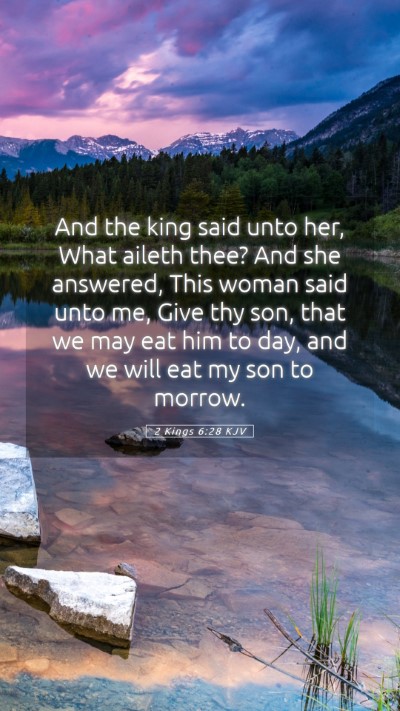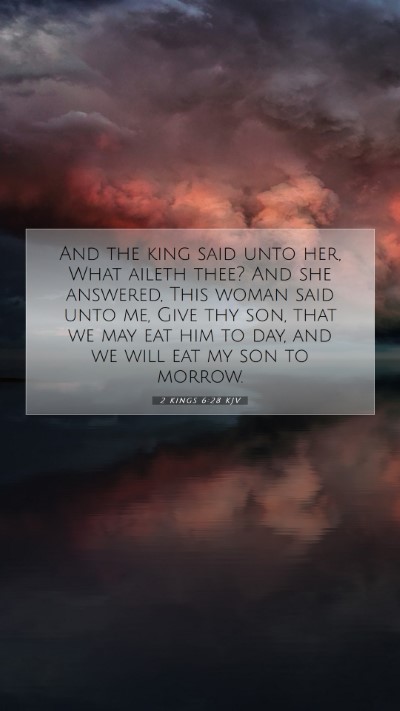Understanding 2 Kings 6:28 - Biblical Commentary
Verse: 2 Kings 6:28 - "And the king said unto her, What aileth thee? And she answered, This woman said unto me, Give thy son, that we may eat him to day, and we will eat my son to morrow."
Context: This verse is situated during a time of great famine in Samaria, caused by the siege laid by the Arameans. The desperation of the people leads them to unthinkable actions, reflecting the severity of their situation.
Summary of Insights from Public Domain Commentaries
Overview of the Situation
In this passage, we witness a conversation between the king and a woman during a time of extreme famine. The distress is evident as the woman reveals that she is contemplating cannibalism due to starvation.
Matthew Henry emphasizes that the famine was so severe it led to acts that were both shocking and tragic, underlining the extent of human suffering and depravity when faced with dire circumstances.
Albert Barnes notes that this scenario highlights not only the physical hunger but also the moral decay that such a situation can provoke, raising questions about society's values and the extreme measures taken for survival.
Adam Clarke elaborates by stating that the act of offering children for food is a grim representation of desperation, pointing out that the consequences of a long siege result not only in physical challenges but also in spiritual and ethical dilemmas.
The Psychological and Social Impacts
This verse also reflects the psychological despair faced by the people in a time of crisis. Henry argues that the dialogue reveals a breakdown of societal norms, illustrating how fear and hunger can lead to a collapse of moral boundaries.
Barnes adds that the king's inquiry into the woman's plight shows a moment of helplessness, as even the authority figure is swept up by the devastating circumstances and the desperation of his subjects.
Theological Implications
The horrors depicted raise significant theological questions about suffering and divine providence. Clarke infers that such events challenge our understanding of God’s justice and mercy, prompting deeper reflection on the reasons behind human suffering.
Henry posits that this story serves as a sobering reminder of the consequences of sin and rebellion against God, where such calamities often result from turning away from divine guidance.
Cross References
- Deuteronomy 28:53: Prophecy about the consequences of disobedience where people would resort to cannibalism.
- Jeremiah 19:9: A parallel passage where similar acts are discussed during the siege of Jerusalem.
- Lamentations 2:20: Describes the desperation of families during a famine.
Application and Relevance Today
Though this scripture comes from an ancient context, it serves as a powerful reminder of the lengths to which people can go in times of distress. Today, this may prompt our society to reflect on current issues such as poverty, desperation, and the moral implications of survival.
Furthermore, understanding such difficult Bible passages allows readers to see the importance of compassion, the need for community support, and the dire consequences of neglect.
Conclusion
In conclusion, 2 Kings 6:28 is not just an account of desperation but an invitation to ponder the broader themes of suffering, moral decay, and the quest for understanding Scripture in times of trial. It challenges believers to seek deeper meanings in biblical narratives and apply those insights to modern-day dilemmas.


